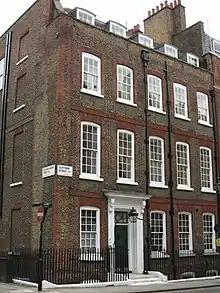Buck's Club
Buck's Club is a gentlemen's club in London, located at 18 Clifford Street, established in June 1919. P. G. Wodehouse mentions it in some stories and modelled his Drones Club mostly after Buck's. It is probably best known for the Buck's Fizz cocktail, created there in 1921 by its bartender McGarry.
 | |
 | |
| Type | Gentlemen's club |
|---|---|
| Founded | 1919 |
| Founder | Herbert John Buckmaster |
| Headquarters | 18 Clifford Street, London , United Kingdom, SW1 |
| Website | bucksclub.co.uk |
Anthony Lejeune in his book The Gentlemen's Clubs of London (1979) comments that "Buck's Club is the only London Club to have been founded since the First World War which ranks, in social prestige and elegance, with the best of St James's Street clubs: and like them, it is named after its founder."[1] In 2019, the club received media attention for its dinners in which young women are invited to entertain the elderly male members.
History
During the First World War, Captain Herbert John Buckmaster (1881-1966)[2] of the RHG and some of his colleagues agreed that after the war it would be good to establish a gentlemen's club that was somewhat less stuffy than those that currently existed. Indeed, they particularly wanted a club with an American Cocktail Bar, something then beyond the pale for most traditional gentlemen's clubs.
The club was established in June 1919[3][4][5] and its American Bar was a focal point. American members were welcome although treated separately from a constitutional standpoint. The club for many years kept its tradition of sourcing members from the Household Cavalry regiments although its membership is now drawn from many walks of life and is renowned for its exuberance and the youth of its membership.
The Club is probably best known for seeing the creation of the Buck's Fizz cocktail in 1921 by its first bartender, Mr McGarry (Barman from 1919 to 1941,[4] sometimes "Malachy McGarry" or "Pat McGarry", or spelled "MacGarry", he is also usually credited with creating the Sidecar cocktail).
It receives three mentions in the stories of P. G. Wodehouse;[6] Wodehouse modelled his fictional Drones Club after the Buck's Club and the Bachelors' Club, even naming his club's barman "McGarry" too.
Bond Street Horticultural Society
The "Bond Street Horticultural Society", also known as "Nieces' Night", is a dinner held several times a year at Buck's. On this occasion, the members are encouraged to invite young women to come along, who are then rotated between tables with each course.[7] While some women told the Financial Times that they enjoyed the attention by the all-male, mostly elderly members, others described the experience as unpleasant or "vile".[7] The club discussed discontinuing the tradition after the Presidents Club scandal in 2018 exposed sexual misconduct at another all-male high-society dinner, but decided against it.[7]
See also
- List of London's gentlemen's clubs
Notes and references
- Lejeune, A. (1979) The Gentlemen's Clubs of London, Dorset Press.
- "Herbert Buckmaster: the man who put the 'Buck' into Buck's Fizz". The Old Shirburnian Society. 26 March 2019. Retrieved 10 October 2020.
-
English Heritage (1963). ""Cork Street and Savile Row Area: Clifford Street, South Side: No. 18 Clifford Street: Buck's Club" (page 482-88)". Survey of London: volumes 31 and 32: St James Westminster, Part 2 (at British History Online). Retrieved 11 August 2007.
Buck's Club was founded here in June 1919 by Captain H. J. Buckmaster 'and a number of fellow officers of the Blues'.
-
Alexander-Sinclair, Ian (report) (2007). "Bertie Wooster's Mayfair". Norman Murphy's talk at Wodehouse Week 2007 (The PGW Society UK). Archived from the original on 27 September 2007.
[...] Buck's Club, founded in 1919 by Herbert Buckmaster in nearby Clifford Street [...] McGarry was the barman at Buck's from 1919 to 1941.
- Two less reliable and possibly inbred sources say 1918: Clubs list from The Royal Bachelors' Club Archived 17 August 2007 at the Wayback Machine; off-site wiki Webtender.com.
- The Buck's Club is visited by Bertie Wooster in 1923's The Inimitable Jeeves and is mentioned in 1931's Big Money and If I Were You.
- Marriage, Madison; Wood, Poppy (25 January 2019). "The Presidents Club investigation: one year on". Financial Times. Retrieved 25 January 2019.